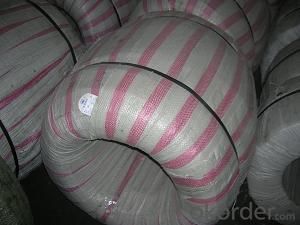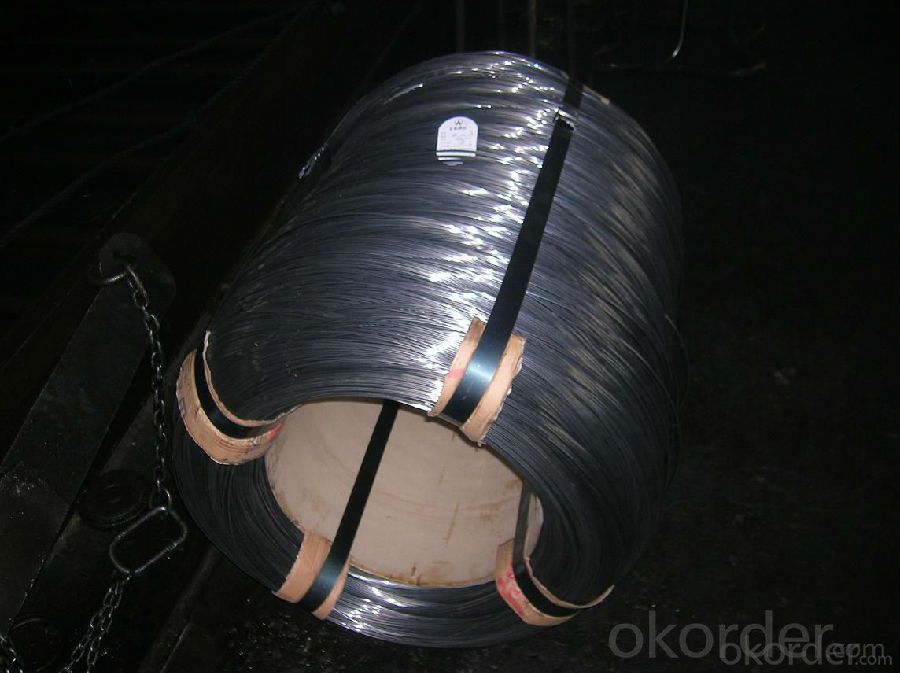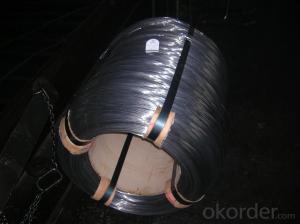COLD SPRING STEEL WIRE
- Loading Port:
- China Main Port
- Payment Terms:
- TT OR LC
- Min Order Qty:
- -
- Supply Capability:
- -
OKorder Service Pledge
Quality Product, Order Online Tracking, Timely Delivery
OKorder Financial Service
Credit Rating, Credit Services, Credit Purchasing
You Might Also Like
Steel grade should be 82B,65Mn,70#,72B,45#,M10etc.diameter range from 0.4 to 2.0mm,package can following customer's required.currently mainly export to SAUDI ARABIA and INDIA.
we can satisfying market demands constantly and empoldering new product;can offering wires according to German standards(DIN17223/1,DIN17223/2),American standards(ASTM A227/A227M,ASTM A228/228M,ASTM 231/A231M,ASTM A401/401M),Japanese standards(JIS G3521,JIS G3522,JIS G3560,JIS G3561).and European standards(DIN EN10270-1,DIN10270-2)and so on.


- Q:How does special steel contribute to the heavy equipment industry?
- Special steel contributes to the heavy equipment industry by offering enhanced strength, durability, and resistance to wear and tear. It enables the production of high-performance components and parts, such as gears, axles, and blades, that can withstand heavy loads, extreme temperatures, and harsh environments. The use of special steel in heavy equipment ensures improved safety, increased productivity, and longer service life, making it a critical material for the industry.
- Q:How does special steel perform in terms of corrosion resistance?
- Special steel, also known as stainless steel, performs exceptionally well in terms of corrosion resistance. Due to its high chromium content, it forms a passive layer on its surface that protects it from rusting and corrosion in various environments. This makes special steel suitable for a wide range of applications, including in marine, chemical, and food processing industries, where resistance to corrosion is crucial.
- Q:How is special steel used in the production of automotive parts?
- Special steel is commonly used in the production of automotive parts due to its exceptional strength, durability, and resistance to wear and corrosion. It is utilized in various components such as engine components, transmission gears, axles, suspension systems, and chassis parts. The use of special steel ensures that automotive parts can withstand extreme conditions and heavy loads, thereby enhancing the overall performance and safety of vehicles.
- Q:What are the main factors affecting the wear resistance of special steel?
- There are several main factors that affect the wear resistance of special steel. Firstly, the composition of the steel plays a crucial role. The addition of certain alloying elements, such as chromium, vanadium, and tungsten, can significantly enhance the wear resistance of the steel. These elements form hard carbides or nitrides within the steel matrix, which increase its hardness and resistance to wear. Secondly, the heat treatment process used on the steel greatly influences its wear resistance. Through processes like quenching and tempering, the steel can be hardened to achieve a desired level of wear resistance. The heat treatment also helps in refining the microstructure of the steel, making it more resistant to wear and deformation. Thirdly, the microstructure of the steel is another important factor. The presence of fine grains and a homogeneous distribution of carbides or other reinforcing phases within the steel matrix greatly enhances its wear resistance. Additionally, the presence of retained austenite, a metastable phase, can also contribute to improved wear resistance. Furthermore, the hardness of the steel is a key determinant of its wear resistance. A higher hardness level generally translates to better wear resistance, as it provides resistance against the abrasive forces acting on the steel surface. Lastly, the design and surface finish of components made from special steel also affect their wear resistance. The shape, size, and surface roughness of the components can influence the distribution and magnitude of the contact stresses on the steel, thereby affecting its wear resistance. In conclusion, the wear resistance of special steel is influenced by factors such as its composition, heat treatment, microstructure, hardness, and the design and surface finish of the components. By carefully considering these factors, engineers can optimize the wear resistance of special steel for various applications.
- Q:How does special steel perform in extreme heat conditions?
- Special steel is specifically designed to perform exceptionally well in extreme heat conditions. It exhibits high resistance to thermal fatigue, oxidation, and creep, making it suitable for applications that involve exposure to intense heat. The unique composition and processing techniques used in the production of special steel allow it to retain its mechanical properties and structural integrity even at elevated temperatures. One of the key characteristics of special steel is its high melting point, which prevents it from melting or deforming easily under extreme heat. This property is crucial in industries such as aerospace, power generation, and automotive, where components are subjected to intense heat and need to maintain their shape and functionality. Furthermore, special steel possesses excellent heat resistance, meaning it can withstand and dissipate heat effectively without losing its strength or becoming brittle. This property ensures that the steel remains durable and reliable even when exposed to prolonged high-temperature environments. Special steel also exhibits outstanding oxidation resistance, forming a protective layer on its surface that prevents it from corroding or degrading when exposed to oxygen at high temperatures. This resistance to oxidation allows special steel to maintain its performance and structural integrity over extended periods, making it highly suitable for applications in extreme heat conditions. In summary, special steel performs exceptionally well in extreme heat conditions due to its high melting point, heat resistance, and oxidation resistance. Its ability to withstand thermal fatigue, oxidation, and creep makes it a reliable and durable choice for applications that require superior performance in high-temperature environments.
- Q:Can special steel be used in the energy sector?
- Indeed, the energy sector can utilize special steel. This term encompasses a range of high-performance alloys that are specifically crafted for applications necessitating exceptional strength, durability, and resistance to corrosion and extreme temperatures. These qualities render special steel an optimal choice for numerous components employed in the energy sector. Within the oil and gas industry, special steel is frequently employed in the construction of pipelines, drilling equipment, and offshore platforms. Its robustness and resistance to corrosion guarantee the integrity and reliability of these vital structures, even in challenging environments. Special steel is also extensively employed in power generation plants. For instance, in thermal power plants that generate steam for electricity production, special steel is employed in the production of boiler tubes and pressure vessels. The extraordinary heat resistance and structural integrity of special steel ensure the secure and efficient operation of these components, even under high temperatures and pressure. Moreover, special steel finds applications in the renewable energy sectors, such as wind and solar power. In the case of wind turbines, special steel is utilized in the manufacturing of rotor shafts, gears, and bearings, all of which undergo substantial mechanical loads. Similarly, in concentrated solar power plants, special steel is employed for the construction of heat exchangers, receivers, and storage systems. Overall, the presence of special steel in the energy sector plays a pivotal role in enhancing the performance, safety, and longevity of various components and structures. Its exceptional properties make it an indispensable material, supporting the infrastructure and operations of the energy industry.
- Q:What are the different methods for improving the corrosion resistance of stainless special steel?
- There are several methods for improving the corrosion resistance of stainless special steel. Some of the common methods include alloying the steel with elements such as chromium, nickel, and molybdenum, which enhance its resistance to corrosion. Another method is passivation, which involves treating the steel with an acid solution to remove any surface contaminants and create a protective oxide layer. Coating the steel with materials like paint, powder coating, or electroplating can also improve its corrosion resistance. Additionally, proper cleaning and maintenance practices, such as regular removal of dirt and debris, can help prevent corrosion and maintain the steel's resistance over time.
- Q:How does special steel perform in terms of impact resistance?
- Special steel generally performs well in terms of impact resistance. It is specifically engineered to have higher toughness and strength, allowing it to withstand impacts and deformations without fracturing or breaking easily. This makes special steel an excellent choice for applications that require durability and protection against sudden forces or impacts, such as in manufacturing machinery, construction equipment, and automotive components.
- Q:How does special steel contribute to the manufacturing of structural components?
- Special steel contributes to the manufacturing of structural components by offering superior strength, durability, and resistance to corrosion. It provides structural integrity and stability in various applications such as buildings, bridges, and machinery, ensuring the safety and longevity of these structures. Additionally, the specific properties of special steel, such as its ability to withstand extreme temperatures or high pressure, make it an ideal material for critical structural components, thereby enhancing overall performance and reliability.
- Q:How does special steel contribute to reducing product waste during manufacturing?
- Special steel contributes to reducing product waste during manufacturing by offering superior strength, durability, and corrosion resistance. Its unique properties allow manufacturers to produce components that are longer-lasting and more resistant to wear and tear. This reduces the need for frequent replacements or repairs, ultimately minimizing product waste and increasing overall efficiency in the manufacturing process.
1. Manufacturer Overview |
|
|---|---|
| Location | |
| Year Established | |
| Annual Output Value | |
| Main Markets | |
| Company Certifications | |
2. Manufacturer Certificates |
|
|---|---|
| a) Certification Name | |
| Range | |
| Reference | |
| Validity Period | |
3. Manufacturer Capability |
|
|---|---|
| a)Trade Capacity | |
| Nearest Port | |
| Export Percentage | |
| No.of Employees in Trade Department | |
| Language Spoken: | |
| b)Factory Information | |
| Factory Size: | |
| No. of Production Lines | |
| Contract Manufacturing | |
| Product Price Range | |
Send your message to us
COLD SPRING STEEL WIRE
- Loading Port:
- China Main Port
- Payment Terms:
- TT OR LC
- Min Order Qty:
- -
- Supply Capability:
- -
OKorder Service Pledge
Quality Product, Order Online Tracking, Timely Delivery
OKorder Financial Service
Credit Rating, Credit Services, Credit Purchasing
Similar products
New products
Hot products
Hot Searches
Related keywords





























